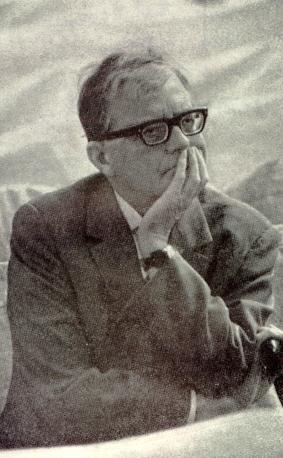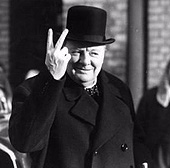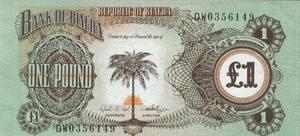We are developing the social individualist meta-context for the future. From the very serious to the extremely frivolous... lets see what is on the mind of the Samizdata people.
Samizdata, derived from Samizdat /n. - a system of clandestine publication of banned literature in the USSR [Russ.,= self-publishing house]
|
I am not really in the market for big, long books about the Cold War, but I do like a good short one from time to time, and Communism by Richard Pipes, is looking good so far. I started by reading the conclusion, and now I am reading the penultimate chapter, “The Third World”.
Here is what Pipes says about the relationship between poverty and Communism:
Conventional wisdom holds that poverty breeds Communism. Reality is different: poor countries do not opt for Communism. Nowhere in the world has a poor majority, or any majority for that matter, voted the Communists into power. Rather, poor countries are less able to resist Communist takeovers because they lack the institutions that in richer, more advanced societies thwart aspiring radical dictators. It is the absence of institutions making for affluence, especially the rights of property and the rule of law, that keeps countries poor and, at the same time, makes them vulnerable to dictatorships, whether of the left or right variety. In the words of a student of the Cambodian Communist regime, the most extreme on record, ‘the absence of effective intermediary structures between the people and their successive leaders predisposed the society to the unrestrained exercise of power.’ Thus, the same factors that keep countries poor – above all, lawlessness – facilitate Communist takeovers.
That rings true. In general, it has always seemed to me that the favourite metaphor of ‘rabid anti-communists’ (i.e. the people who underestimated the true depths of Communist disgustingness only somewhat), to the effect that Communism was like a disease, is dead right. And Pipes is asking: how strong was your country’s immune system?
Far be it from me to find anything hopeful about the PSOE election victory in Spain last weekend. After two election terms of relative fiscal sanity and an end to the grotesque corruption of the Felipe Gonzalez era, a return to PSOE government is bad news for Spain. It is also extremely bad news for the rest of the European Union, as this represents a shift away from pragmatism towards an (even more) collectivist EU agenda.
It is not however, necessarily good news for terrorism. Among the multitude of scandals faced down by the previous Spanish Socialist government the ‘GAL affair’ looms large.
GAL was the name assumed by a anti-ETA terror group in the 1980s that entered France and murdered ETA members and supporters. I no longer have the details but there was a spate of terrorist attacks on Basques living in the Bordeaux area, as well as closer to the Spanish border.
Following the arrest of several GAL members it transpired that they were all either members of law-enforcement agencies and the armed forces, or recently had been. It later emerged that the money to finance GAL came from the Ministry of the Interior and was signed off ultimately by the Minister. Whilst the Prime Minister Felipe Gonzalez himself was never proven by documentary evidence to have sanctioned the GAL death squad, let me just say that if he ever wins a libel action on the issue, I will be amazed.
Two things are worth noting, firstly that both the French and Spanish governments were under Socialist control at the time, second that Spanish public opinion was firmly on the side of the death squads: the only non-Basque critics of the policy tended to shut up because it was their own party that was doing the dirty deeds.
In France the President from 1981 to 1995 was François Mitterrand, the former far-right youth organisation member turned founder of the modern French Socialist Party. It is worth noting his record as an Interior Minister in the 1950s.
In 2001, one of the big political scandals was the publication of Services Spéciaux: Algérie 1955-1957, by the retired General Paul Aussaresses. The French Left went beserk and managed to get the retired former leader of the Action Service to have his Légion d’honneur withdrawn. They also tried to get his pension removed. The ostensible reason was that General Aussaresses had exposed and admitted the use of torture against Algerian terrorists during the Battle of Algiers.
In my copy of this extremely interesting book I find on page 12:
De son côté, François Mitterrand, le ministre de l’Intérieur chargé des départements français de l’Algérie, considérant que la police était impuissante à maintenir l’ordre républicain, envoya son directeur de cabinet au ministère de la Défense nationale pour y requérir la troupe et déclara sans ambiguité ce même 12 novembre, devant les députés: “Je n’admets pas de négotiations avec les enemis de la Patrie. La seule négotiation, c’est la guerre!”
My translation: For his part, François Mitterrand, the Minister of the Interior responsible for the French administrative districts of Algeria, believing that the police was powerless to maintain the Republic’s peace, sent his chief advisor to the Ministry of National Defense to resquest the use of troops [including the 11th Shock Paras, better known as the Action Service]. He also declared without ambiguity on the 12th November, before the Chamber of Deputies [French House of Representatives]: “I will not tolerate negotiations with the enemies of the Fatherland. The only negotiation, is war!”
It took the removal of the French Socialists and the introduction of the General de Gaulle to bring about appeasement of the Algerian terrorists. There is a strand of Western Socialist thought that takes the secular State seriously. I seriously doubt if there will be any safe-haven for Islamist terrorists in Spain for the forseeable future. Jacobins ain’t soft on Terror.
Yesterday evening I was channel hopping by way of relaxation and chanced upon a UKTV History programme about the Cold War, and in particular about the doings and sayings of the rocket scientists. (Here is the UKTV History home page, but I can find no internet reference to this particular programme.)
The programme seemed fairly good, on the whole, but towards the end of it there was one glaring – not to say outrageous – non sequitur. → Continue reading: The UKTV History channel – underestimating Ronald Reagan and his rocket men
I was and am a devout anti-Communist. I rejoice that civilisation won the Cold War, detest the evil folly that was Marxism-Leninism-Stalinism-decrepitudism, and regret that the Russian Revolution was not strangled at birth. But (and you could hear that coming couldn’t you?) as far as I am concerned, Dimitri Shostakovich (1906-1975) was almost certainly a better composer after Stalin had given him his philistine going-over following the first performances of Lady Macbeth of Mtsensk, than he would have been if Stalin had left him alone. Although both are very fine, I prefer Symphony Number 5 (“A Soviet Artist’s Reply to Just Criticism”) to Symphony Number 4.
 Had Shostakovich continued unmolested along the musical path he was travelling before Stalin’s denunciation of him, I don’t think he would merely have become just another boring sub-Schoenbergian modernist. He was too interesting a composer for that already. But I do not think his subsequent music would have stirred the heart in the way his actual subsequent music actually does stir mine, and I do not think I am the only one who feels this way. → Continue reading: Dimitri Shostakovich was a very nervous man
Devoid of inspiration, I looked in my library and found Soviet Communism – A New Civilisation by Sidney and Beatrice Webb. There is no question mark in the title of my 1937 Left Book Club edition, and it was “NOT FOR SALE TO THE PUBLIC” (as it says on the front). And a good thing too, I muttered, as I scanned through it, looking for something particularly vile and wrong-headed for you people to have a good chuckle and a good sneer at.
Imagine my surprise, then, to encounter a paragraph of complete truth. Admittedly I had to go to page 1122 to find it, but even so, don’t you think that this is really rather good?
We place first in far-reaching importance the complete discarding, as the incentive to production, of the very mainspring of the western social order, the motive of profit-making. Instead of admiring those who successfully purchase commodities in order to sell them again at a higher price (whether as merchant or trader, wholesale dealer or retailer). Soviet Communism punishes such persons as criminals, guilty of the crime of “speculation”. Instead of rewarding or honouring those (the capitalist employers or entrepreneurs) who engage others at wages in order to make a profit out of the product of their labour, Soviet Communism punishes them as criminals, guilty, irrespective of the amount of the wages that they pay, of the crime of “exploitation”. It would be difficult to exaggerate the difference that this one change in ideology (in current views of morality as well as in criminal law) has made in the manner of life within the USSR. No one can adequately realise, without a wide study of the facts of soviet life, what this fundamental transformation of economic relationships has meant, alike to the vast majority of the poor and to the relatively small minority who formerly “lived by owning”, or by employing others for profit.
The paragraphs that follow revert to the evil drivel of which this book mostly consists, as the elderly dupes try to explain how none of this did any harm. But even so, something of a surprise.
Islam’s Black Slaves: The Other Black Diaspora
Ronald Segal
Farrar, Strauss and Giroux, 2001
Race and Slavery in the Middle East: A Historical Enquiry
Bernard Lewis
OUP; 1994
To treat this subject it is really necessary, as Segal has done, to run through the history of Islam from Western India to Western Africa, for during the whole of the period of more than 1300 years black slaves have been acquired and traded increasingly with the spread of Islam – indeed, it might be said that one reason for the spread of Islam was trade, of which slaves were a considerable part.
In Islam’s Black Slaves Segal makes very clear the difference between the Islamic trade, and the use to which it was put, and the transatlantic trade that brought blacks to the Americas. He has already written a book about the latter subject, The Black Diaspora, and it is probable that he regards it as the greater crime. Slaves in the Islamic world were much more for domestic use and while in the Americas the imports were predominantly male, within Islam females outnumbered males by two to one, probably (though this is not mentioned explicitly) because slave-raiding involved killing the men to secure the women and children (as opposed to slave-trading with the black kingdoms on the African West Coast). Segal claims, however, that though the journeys of the slave-caravans were terrible, once the slaves had, so to speak, arrived at their final destination, their treatment was relatively humane. → Continue reading: Slavery under Islam
Indian: A History
John Keay
HarperCollins, 2001
Soldier Sahibs: The Men Who Made the North-West Frontier
Charles Allen
Abacus (paperback), 2001 (first published in hardback 2000)
I have to begin with a confession: John Keay’s big and excellent book (576 pages, including notes, bibliography and index) is the first history of India I have read right through, though I have consulted and skimmed through others on my shelves. So it is impossible to keep in my head even the mainstream facts. From its final chapter, Crossing the Tracks, 1948 –, a metaphor of the historian’s journey “who … must get down from the air-conditioned express … cross the tracks and elbow his way aboard a slower, noisier train”, I gather that in it “India” no longer includes Pakistan, or even Bangladesh, a narrowing from the previous inclusive vista of the whole sub-continent. This may be a concession (together with others) to the fact that the title page gives “HarperCollins Publishers India” below “HarperCollins Publishers London” [their italics].
Indian nationalists may make grandiose claims for the age of their civilization, but the fact remains that its documentation does not really exist before the first Moslem incursion in the 8th century. The first civilizations so far discovered, Harappa and Mohenjo-daro, which are of course in territory now in Pakistan, cannot be linked with any other, even negatively by being shown convincingly to have been destroyed by the incoming Aryans, whose religion, the treatment of which is understandably sketchy, though not language, penetrated to the end of the peninsula; the history of Ceylon is left out.
Within this anonymous era, sparsely illuminated by oral myths and some inscriptions, there are a few peaks, such as Alexander’s invasion, which left written history behind it, in Greek. “Ashoka … India’s first defined historical personality” (p. 95 – never mind Porus), died in 231 BC, left some jargon-free, high-minded edicts carved on stone monuments – “extending from Orissa to Mysore, Bombay, Junagadh, Kandahar, Peshawar and Dehra Dun” – and, after uniting much of northern and central India, left an empire that quickly fell to pieces – like many other subsequent ones.. → Continue reading: A history of India and a history of the Indian Mutiny
One of the most potent anti-liberty memes has been that simple phrase, the “Wild West”. Wild as in lawless, violent, murderous. And one of the most potent pro-liberty memes is therefore, if only because it negates the first meme, the fact that the Wild West was, in the words of a famous Journal of Libertarian Studies article by Terry Anderson, the Not So Wild Wild West.
Here is another article, The American West: A Heritage of Peace by Ryan McMaken, dealing with the history of the West, and with the history of its history, in the form of Western novels and of course “westerns”, that is to say movies set in that Wild Wild West. This makes similar points to those made by Terry Anderson, and the one link in McMaken’s article is to Anderson’s.
McMaken ends his article thus:
Unfortunately for novelists and filmmakers, the American West was far less exciting than we have long been led to believe. The frontiersmen knew this themselves. In his old age, Buffalo Bill Cody, one of the most flamboyant architects of our perceptions of the West, openly admitted to lying about his violent exploits to sell more dime novels. He was, after all, wounded in battle with Indians exactly once, not 137 times as he claimed. And such tales are no doubt popular with many Americans today who seem increasingly open to believing almost anything about the West as long as it is simultaneously exciting and violent and bleak.
As with so many success stories, however, the story of the West is primarily a story of hard work, trade, tedium, and peace. The original mythmakers would have us believe that the settlement of the West was some kind of crusade. A war of righteous American legions against everybody else. In reality, there were no legions, and there was certainly very little righteousness.
There were men and women trying to make a better life for themselves, acting under their own will, and pursuing their own ends. On the other end of the spectrum, the purveyors of the new Western victimology would have us believe that these individuals brought with them messiah complexes and violent tendencies which would never be brought under control until “civilization” caught up with them. Yet, the messiah complexes, the “Manifest Destiny,” and the raging violence have always mostly resided in the minds of politicians, pundits, novelists, and movie directors; none of whom ever tamed any land harsher then their own back yards.
As I say, this is a familiar theme among libertarians. I thank my fellow London libertarian Patrick Crozier for alerting me to this piece, and I also checked through the archives here just to make sure that no Samizdatistas had already commented on it. This is familiar stuff – but familiar because so persuasive and important, and for that reason, worth any amount of supportive comment.
Unintended Consequences: The Impact of Factor Endowments, Culture, and Politics on Long-Run Economic Performance (Ohlin Lectures)
Deepak Lal
MIT Press, 1998
I felt I had to read this book twice to fully appreciate its message, yet it is not difficult to read, indeed to do so is easy and a pleasure. It must have been equally a pleasure to attend the lectures on which it is based. But a large accumulation of facts, each one of which can be seen to be relevant to the thrust of the book, are difficult for the reader (or anyway, by me) to hold ready to slot into a logical structure to be reproduced in a satisfying synthesis in the memory when the book is finished.
As for the “unintended consequences” of the title, these are the results of social structures, political motives and individual actions which often have quite different aims: “We have known since Adam Smith that an unplanned but coherent and seemingly planned social system can emerge from the independent actions of many individuals and in which the final outcomes can be very different from those intended. All this, I hope, is uncontroversial,” writes the author (p. 7). Well, I hope so too – but “we” needed Hayek and the collapse of Communism to convince a lot of other people.
Lal seeks to find an answer to the question why the explosive development that characterised the Industrial Revolution took place in Western Europe, though he merely mentions Great Britain as its origin, without further analysis (p. 20). Why not in the other great areas of civilization – India, China or Islam? He proceeds to examine the civilizations that arose after the development of agriculture from about 10,000 BC; pastoralism as a parallel development is mentioned but left undiscussed, presumably because it is basically predatory on and if successful, assimilated into neighbouring agricultural civilizations.
Such civilizations typically reach an optimum through what Lal labels Smithian growth, where greater efficiency is generated by division of labour and by trade, capitalism being the result (according to the precepts of Adam Smith). They are, however, limited by having only human and animal power and organic, rather than mineral sources of fuel. The breakthrough to Industrial Civilization, technologically based with mechanical power and virtually unlimited energy from mineral resources, Lal calls Promethean growth and this was evolved only in Western Europe. The question is: why? → Continue reading: How did Europe reach Promethean growth?
Not long ago, our beloved David Carr did a characteristic posting here entitled The joys of pessimism.
Here is how David ended that posting:
I heartily recommend pessimism. It enables you to amaze your friends with your powers of prediction and bask in the satisfaction of being borne out by events.
As he constantly is, I am sure you would all agree.
I remembered this while I was dipping today into Hitler and Churchill – Secrets of Leadership by Andrew Roberts.
Here is what Roberts says, on p. 93 of my 2003 hardback edition, about Winston Churchill’s wartime leadership:
‘Long dark nights of trials and tribulations lie before us,’ he warned in an especially bleak radio address. ‘Not only great dangers, but many more misfortunes, many shortcomings, many mistakes, many disappointments will surely be our lot. Death and sorrow will be companions of our journey, constancy and valour our only shield. We must be united, we must be undaunted. We must be inflexible.’ One man who immediately recognised the strategy behind Churchill’s dismal honesty was Joseph Goebbels. ‘His slogan of blood, sweat and tears has entrenched him in a position that makes him totally immune from attack,’ wrote the Nazi propaganda chief in a magazine article entitled ‘Churchill’s Tricks’. ‘He is like the doctor who prophesies that his patient will die and who, every time his patient’s condition worsens, smugly explains that he prophesied it.’ By preparing the public for bad news, Churchill denied the Nazis the full propaganda value of their victories. They could not wreck national morale if Britons had already heard the worst from the Prime Minister himself.
So now we know. David is really trying to cheer us all up.
 
The bulldog breed
Here on Samizdata we seem to make a point of remembering things that happened on today’s date but in an earlier year.
So does the New York Times. Their “ON THIS DAY” section today contains this poignant and thought provoking item:
On Feb. 26, 1993, a bomb exploded in the garage of New York’s World Trade Center, killing six people and injuring more than 1,000 others.
It’s a cruel thought, but suppose that if, instead of killing six people, this explosion had killed, say, three hundred and fifty. Given that it injured a thousand, it presumably might have killed many more. Had it done so, that actually might have saved quite a lot more lives, come a certain later date, in September 2001. Not that anyone would ever have known.
Which of course also gives rise to the even crueller thought that, when it comes to the actual body count on that later date, America might even then have got off quite lightly. Once again, we will never know.
Whilst undertaking a major reorganization of my house and all the junk accumulated over many years, I have been constantly rediscovering little treasures at the bottom of boxes or at the back of seldom visited closets which have not seen the light of day for many years.
One of the most interesting items to emerge today was a pristine £1 note issued by the Bank of Biafra: a poignant reminder of a truly savage war which raged between the Nigerian Federal Government and Ibo Separatists from 1967 until 1970. I acquired the banknote during a trip I took to Nigeria in the late 1970’s with my grandfather. A business associate of my grandfather was a former Biafran soldier and gave it to me after we had a very interesting chat when we visited his home in Port Harcourt.

click for bigger image The daily images of starving children with beri-beri during the dying days of the Biafran Republic was one of the first things I saw on television as a child which I recall having made a real impact on me. That was also what started both my fascination with Africa and my abiding cynicism towards it. I find objects like this bank note a fascinating bit of not-so-far-off history that one can hold in one’s hand and finding such things is one of the reasons I have always so enjoyed travelling.
|
Who Are We? The Samizdata people are a bunch of sinister and heavily armed globalist illuminati who seek to infect the entire world with the values of personal liberty and several property. Amongst our many crimes is a sense of humour and the intermittent use of British spelling.
We are also a varied group made up of social individualists, classical liberals, whigs, libertarians, extropians, futurists, ‘Porcupines’, Karl Popper fetishists, recovering neo-conservatives, crazed Ayn Rand worshipers, over-caffeinated Virginia Postrel devotees, witty Frédéric Bastiat wannabes, cypherpunks, minarchists, kritarchists and wild-eyed anarcho-capitalists from Britain, North America, Australia and Europe.
|






